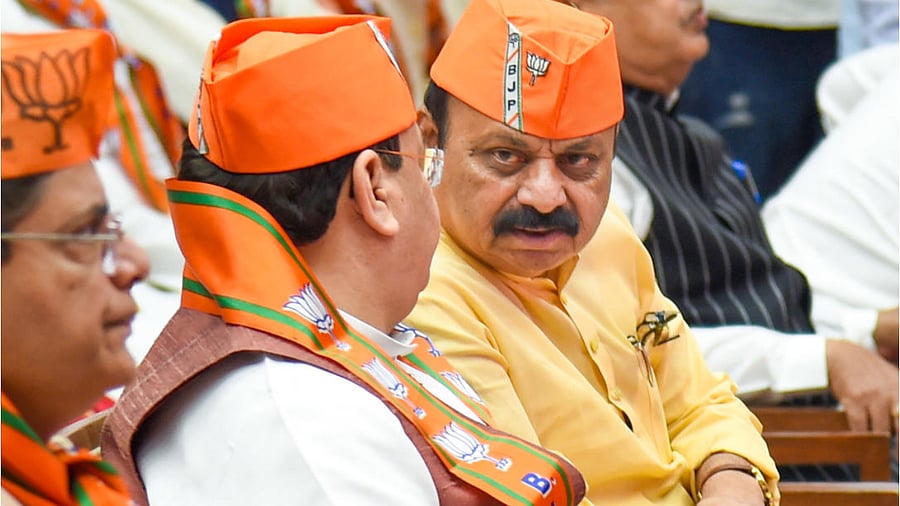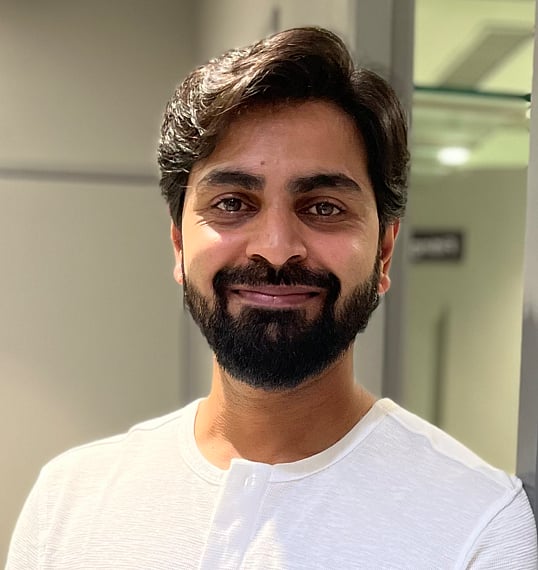
In Karnataka, which is a year away from its Assembly polls, the narrative driving the public discourse is so noisy that it has drowned out the sound of Chief Minister Basavaraj Bommai’s development and welfare plank.
This seems to be a worry for Bommai, a man in a hurry to prove himself in an election year. Already, the Bommai administration has issued at least four orders giving effect to his Budget promises of starting a new milk cooperative bank, relaunching the Yeshasvini health insurance scheme, hiking monthly aid for ageing wrestlers and increasing the honorarium paid to mid-day meal cooks and their assistants.
There are standing instructions to all heads of departments that Budget programmes must be implemented soon.
But then, back-to-back issues under the umbrella theme of ‘us versus them’ have rocked Karnataka. It started with the hijab controversy, followed by calls to ban Muslim traders from Hindu religious fairs, then the plan to introduce Bhagavad Gita in school textbooks, a campaign to boycott halal meat and regulate loudspeakers at mosques.
It seems formulaic for the BJP, which wants to retain power in Karnataka, a state that has been its gateway to the south. The ‘us versus them’ plan worked well for the saffron party in Uttar Pradesh, where Yogi Adityanath returned to power convincingly.
Bommai has found himself at the receiving end of criticism for ‘encouraging’ communalism, starting from his apparent justification of moral policing.
“Take it from me,” a BJP leader occupying a key position says, requesting anonymity, “this will continue till the Hindu base is strengthened. Then, PM Modi will come and it’ll be all about development.”
This leader cited Uttar Pradesh’s example. “Uttar Pradesh always had caste-based politics. But this time, the polls happened on the Hindutva plank. That’s the model where the idea is to move away from castes. The Congress will stick to the same Dalit and backward classes politics whereas we’ll be saying that everybody is a Hindu,” the leader explained.
There is talk that it was inevitable for the BJP to keep the pot boiling and secure its core ideological base after a fiasco earlier this year that saw the Union government rejecting Kerala's Republic day tableau featuring social reformer Sri Narayana Guru. This had an adverse effect in Karnataka where Narayana Guru has a considerable following.
The foundation was laid even before Bommai took office when the previous BS Yediyurappa administration introduced a blanket ban on cattle slaughter.
Then, the Bommai administration brought a law to protect illegal shrines from demolition and the Anti-Conversion Bill. A law to free Hindu temples from government control is in the pipeline.
Also Read | The Polarisation Game: Blame it on Bommai
But, multiple sources told DH that the worry plaguing Bommai is real. Sample this: Earlier this month, the Animal Husbandry department asked the Bruhat Bengaluru Mahanagara Palike to see to it that abattoirs and chicken shops in the city “stun” animals first before they are slaughtered. This came bang in the middle of the anti-halal campaign. Bommai then directed Animal Husbandry Minister Prabhu Chauhan to withdraw the directive. “Let’s not make this big anymore,” a source quoted Bommai as saying.
Of late, BJP leaders have been trying to clear the air.
“It wasn’t the BJP that started the hijab controversy,” BJP national general secretary C T Ravi, a vocal Hindutva proponent, says. “If anything, we thought it was an isolated incident. But, when they called for a bandh even after the High Court judgement came out, we realised it was an organised attempt that got legal and moral support from the Congress. Now, even Al-Qaeda is supporting them,” Ravi says.
He has the same argument for the loudspeaker and all other issues. “Wrong interpretations are being done purposefully,” he says. “On loudspeakers, for example, the Supreme Court has fixed decibel levels and timings for everyone. They didn’t specify a mosque or temple. Notices have been issued to all religious places. But, the interpretation is that it’s against azan,” he says.
Unifying Hindu votes
But, will the plan to unify Hindu votes work in Karnataka? “It’s too early to say,” M J Vinod, a political science professor at Christ University in Bengaluru, says. “But, certainly there’s a strategy in terms of how these issues are being raised.” He also wonders if the BJP suffers from “low confidence” that is making them raise such polarising issues.
The BJP is still wary of Dalit votes, and attempts to reach out to them with welfare measures are happening aggressively. When the hijab controversy was playing out, the Rashtriya Swayamsevak Sangh, the BJP’s ideological parent, was spooked when blue shawls and ‘Jai Bhim’ chants came out in support of Muslim women in Chikmagalur. “The Sangh had to intervene. The Muslims will try to take along Dalits, but we don’t want any split in the Hindu votes,” the BJP leader quoted earlier said.
Speculation is also rife that the BJP has been asked to focus on assembly constituencies where Vokkaligas and OBC votes are decisive.
While Congress has been accused of failing to formulate an effective strategy to take on the BJP when it comes to ‘communal’ issues, a section of its leaders sees an opportunity to bring back caste groups that are believed to have gone away from the fold. “We need to tackle the castes individually as a response to the Hindutva narrative, because the Ahinda (minorities, backward classes and Dalits) concept is dead,” a Congress lawmaker who dabbles in poll and caste data says. “The Anti-Conversion Bill, for example, affects Dalits who converted to Christianity. Similarly, we need to talk to castes about their specific problems.”
Also Read | Bommai announces sops for SC/STs
Congress has maintained that it will raise “real issues” ahead of the 2023 polls such as unemployment and price rise. “The BJP hasn’t done any development to talk about,” Karnataka Pradesh Congress Committee president D K Shivakumar said. “Their campaign against halal, for instance, affects farmers because they are the ones who keep hens and sheep. Then, to say that mango shouldn’t be sold to Muslims will hit farmers. Already, the farmer is in despair due to high fertiliser costs and high GST on pesticides. Far from doubling farmers’ income, they have halved it,” he said.
A crucial Karnataka BJP executive meeting is scheduled on April 16 and 17 where the party is likely to announce its roadmap for the 2023 Assembly polls. “We’ve never worked with short-term goals. The development agenda is what we will take forward. It has won us elections,” Ravi says, arguing that PM Modi is branded as ‘communal’ though not a single scheme of his government favours one religion or community.
“Minorities take benefits of every government programme, but that doesn’t translate into votes. Why is that,” he asks, continuing his rhetoric.
Five crore voters in Karnataka will answer this question next year.
Watch the latest DH Videos here:

